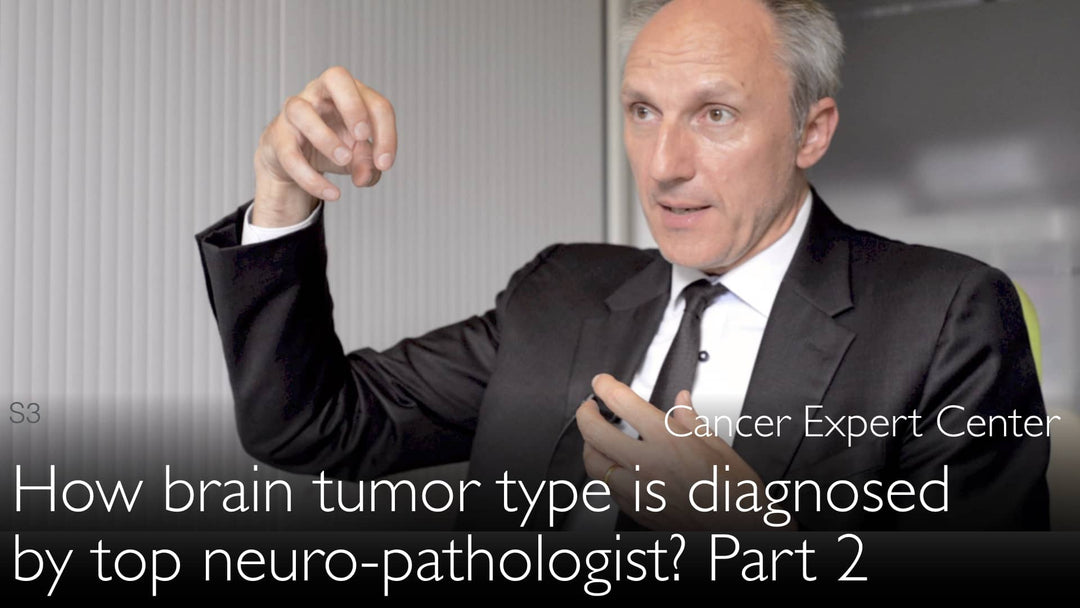Leading neuropathology expert Dr. Sebastian Brandner, MD, explains how multidisciplinary teams combine molecular diagnostics, imaging, and clinical expertise to accurately diagnose brain tumor types and create personalized treatment plans. The neuro-oncology team meets weekly to integrate pathology results with MRI findings, identify targetable mutations, and adjust therapy when needed for optimal patient outcomes.
Advanced Brain Tumor Diagnosis: How Multidisciplinary Teams Personalize Treatment
Jump To Section
- Multidisciplinary Team Approach to Brain Tumor Diagnosis
- Role of Molecular Testing in Brain Tumor Classification
- Integrating MRI with Pathology Findings
- How Molecular Results Guide Targeted Therapy
- P4 Medicine in Neuro-Oncology Treatment
- Advances in Neuropathology Diagnostics
- Full Transcript
Multidisciplinary Team Approach to Brain Tumor Diagnosis
Dr. Sebastian Brandner, MD, emphasizes that accurate brain tumor diagnosis requires weekly collaboration between specialists including radiologists, oncologists, neurologists, and pathologists. The neuro-oncology team reviews each new patient's imaging, biopsy results, and molecular testing to confirm diagnosis and identify treatment opportunities.
This comprehensive approach ensures all clinical data is considered before creating a treatment plan. Dr. Sebastian Brandner, MD, notes the team includes not just physicians but also physiotherapists, psychologists, and clinical nurse specialists to address all aspects of patient care.
Role of Molecular Testing in Brain Tumor Classification
Modern brain tumor diagnosis now routinely includes molecular analysis of tumor tissue according to Dr. Sebastian Brandner, MD. Genetic testing can reveal specific mutations that help classify tumors more precisely than traditional microscopy alone.
These molecular markers have become essential for diagnosis since the 2016 WHO classification update. The neuropathology team performs tests like PCR and sequencing to identify biomarkers that predict tumor behavior and treatment response.
Integrating MRI with Pathology Findings
Dr. Sebastian Brandner, MD, explains how the team compares molecular pathology results with MRI scans to verify diagnostic consistency. Discrepancies between imaging and lab findings trigger additional review to ensure accurate diagnosis.
This integration is particularly important for gliomas and other infiltrating brain tumors where MRI characteristics may correlate with specific genetic alterations. The combined data helps distinguish tumor types with similar appearances but different prognoses.
How Molecular Results Guide Targeted Therapy
When molecular testing identifies actionable mutations, the neuro-oncology team can recommend targeted therapies. Dr. Sebastian Brandner, MD, notes that about 20-30% of brain tumors have genetic alterations that may qualify patients for precision medicine approaches.
Examples include IDH inhibitors for IDH-mutant gliomas or BRAF inhibitors for certain pediatric brain tumors. These targeted treatments often have fewer side effects than conventional chemotherapy when matched correctly to the tumor's molecular profile.
P4 Medicine in Neuro-Oncology Treatment
Dr. Brandner describes the team's approach as P4 medicine - predictive, preventive, personalized, and participatory. This model uses comprehensive diagnostic data to create treatment plans tailored to each patient's specific tumor biology.
The neuropathologist plays a key role by providing the molecular characterization needed for personalized therapy decisions. This represents a shift from one-size-fits-all treatment to precision neuro-oncology.
Advances in Neuropathology Diagnostics
According to Dr. Sebastian Brandner, MD, neuropathology has undergone revolutionary changes in the past decade similar to advances in breast cancer and hematopathology. New molecular techniques allow pathologists to identify hundreds of biomarkers from small biopsy samples.
These diagnostic tools create a direct bridge between laboratory science and clinical care. Dr. Sebastian Brandner, MD, emphasizes that modern neuropathologists actively participate in treatment decisions rather than working in isolation.
Full Transcript
Dr. Sebastian Brandner, MD: We meet weekly with our oncology team to discuss the importance of brain tumor diagnosis. We discuss the molecular class of the brain tumor and talk about the potential differential diagnosis.
That is a team of radiologists, oncologists, neurologists, physiotherapists, clinical nurse specialists, psychologists, and pathologists. This team meets every week to discuss new brain tumor patients who come in with a presumed brain tumor diagnosis.
The team reviews the brain imaging and diagnosis of brain tumor in the patients who had a brain biopsy and surgical operation. Then we put together the pathological diagnosis, which may include molecular information.
Dr. Anton Titov, MD: How does it fit the MRI? Is there a discrepancy? How to formulate a brain tumor treatment plan?
Dr. Sebastian Brandner, MD: In most cases, the brain cancer treatment plan is straightforward. But sometimes we have discovered a certain type of mutation in the brain tumor, and then the treatment plan might be more specific and targeted.
Brain cancer therapy might actually be highly specific to a mutation in the brain tumor. Changes are then directly applied to the patient's treatment.
This is the sort of life cycle of a brain tumor specimen. That's the part of the life cycle where the pathology contributes. It also shows you that we are part of the expert network.
We are not actually hiding behind the microscope or behind the PCR machine. We are an integral part of a multidisciplinary team that helps in understanding and treating brain tumors. This is very important.
Dr. Anton Titov, MD: You highlighted the importance of a multidisciplinary team.
Dr. Sebastian Brandner, MD: For best treatment today, you have to apply P4 medicine, which is personalized medicine. The neuropathologist is at the forefront of that multidisciplinary team for brain cancer diagnosis. The team determines what is really best for that particular patient.
I wouldn't say the neuropathologist is there in the forefront alone. There are many types of cancer where molecular pathology has had similar advances over the last 5-10 years, such as soft-tissue tumors, breast cancer, hematology, and neuropathology.
All these disciplines have usually benefited from a massive advancement of molecular diagnostics.
Dr. Anton Titov, MD: They were applied to the diagnostics of pathological brain tumor samples.
Dr. Sebastian Brandner, MD: So that is a bridge between the science and the bedside.
Dr. Anton Titov, MD: Correct, yes!





